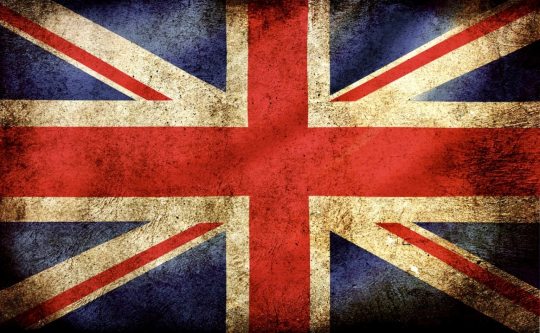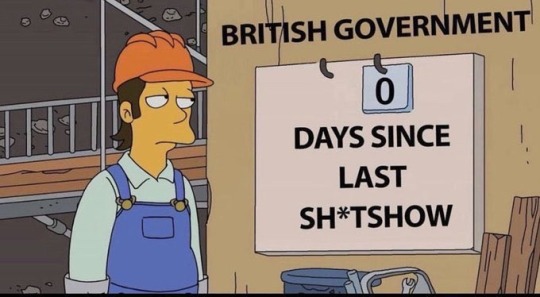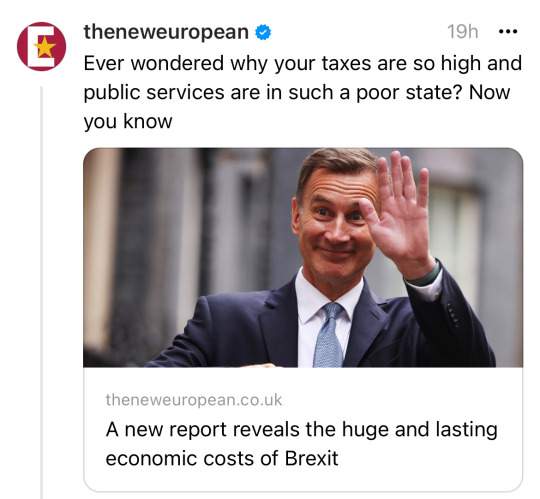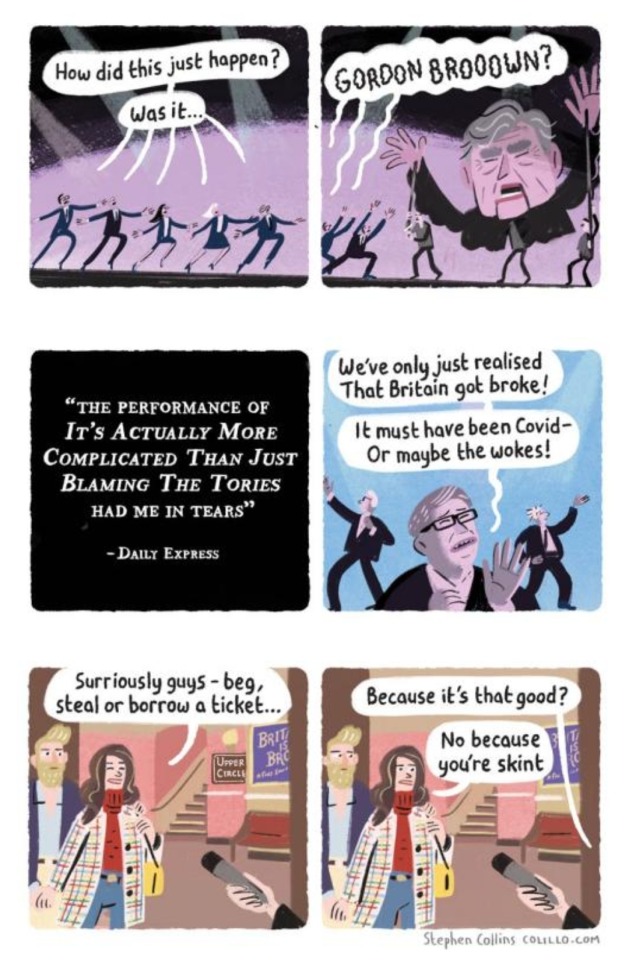#brexit party
Text
THE BIG CON: VOTE REFORM, VOTE BIG BUSINESS
A vote for Nigel Farage’s Reform Party is essentially a vote for big business and the super-rich.
Reform promises to lift 7 million people from paying tax at the lower end of the pay scale to “save every worker almost £1500 per year.” Although I am sure this saving for low earners would be very welcome, it is the rich who benefit most from Reform’s income tax proposals.
At the moment people earning over £50,000 pay a 40% tax rate on earnings above this figure. The Reform Party promise to raise the threshold to £70,000, a saving of £3,588 a year for the 15% richest people in the country.
Reform and the far-right favour business over individual workers. It is therefore no surprise that Corporations are to receive the biggest tax breaks. Corporation tax will be reduced from 25% to 20% for the first 5 years, and then down to 15% after that.
For year ending 2022/23 corporation tax brought in £79.9billion. Under Reform, corporations would be in receipt of tax breaks worth £47.94billion. In November 2022, State of Tax Justice reported that
…”the world was losing over $483 billion a year in tax to multinational corporations and wealthy individuals using tax havens to underpay tax. That’s equivalent to losing a nurse’s yearly salary to a tax haven every second.”
The only reason Reform would want to legitimise corporate tax avoidance is because Reform is essentially a political party for the already wealthy. They might throw a few crumbs to the ordinary worker but the real rewards are to go to the rich and powerful.
Many large corporations are foreign owned so tax breaks for big business are just as likely to go to overseas shareholders as they are to UK owners. Does the British taxpayer really want to be subsidising foreign share ownership by cutting tax revenues?
Richard Tice, leader of Reform until replaced by Nigel Farage a few days ago, is a multi-millionaire who made his money in property development. Both he and Farage have their own TV shows on GB News, which is bankrolled by the hedge-fund billionaire Paul Marshal and the Dubai based investment company Legartum, founded by New Zealand billionaire Christopher Chandler who made his fortune in Russian gas.
Reform's links to the super-rich goes further. Multi-millionaire Jeremy Hosking has given £2.578,000 to Reform coffers. Is it coincidence he is funding a party that campaigns to scrap UK emission targets when he is “the director of a company with tens of millions of pounds invested in oil and gas” ? (Open Democracy: 22/03/22). I think not.
Another major donor to Reform is the ex-Bullingdon Club member George Farmer. (Other members include David Cameron and George Osborne the architects of Tory Austerity and the liar Boris Johnson who brought us Party Gate). An “ardent supporter of Donald Trump”, Farmer was CEO of the far-right platform Parler, and is married to Candice Owens, a woman who “promotes far-right ideologies”, In 2023 he joined the board of GB News.
The biggest single donor to Reform according to Electoral Commission records is Chris Harborne, handing over £10 million to Brexit/Reform. Harborne owes his fortune to the sale of aviation fuel and technology investments. He gained notoriety when his name appeared multiple times in the Panama Papers. These documents revealed:
“…off-shore holdings of world political leaders, links to global scandals, and details of hidden financial dealings of fraudsters, drug traffickers, billionaires, celebrities, sports stars and more”. (International Consortium of Investigative Journalists: 03/03/2016)
These wealthy backers of Reform are not spending millions of pounds in order to benefit ordinary workingmen and women. They see these millions as an investment, an investment on which they expect a return for their money.
#uk politics#boris johnson#Reform#Brexit party#nigel farage#bullingdon club#david cameron#george osborne#panama papers#george farmer#right wing#tax breaks#multi-millionaires
6 notes
·
View notes
Text
Formal apology on behalf of the United Kingdom to the people of the European Union regarding Brexit and a gesture of hospitality
Dear People of the European Union,
I am writing this letter for and on behalf of the United Kingdom to extend our heartfelt apologies for the impact of Brexit on the people of the European Union, and for the personal insult, distress and uncertainty it has caused. I didn’t vote for Brexit, I voted to remain and I have had to learn to respect and accept the outcome of the referendum and it’s…

View On WordPress
#Apology#art#article 50#Austria#backstop#belgium#Border#border control#brexit#brexit deal#brexit impact#brexit party#brexit process#brexit vote#Bulgaria#citizens rights#conservatives#customs arrangements#customs checks#customs union#Cyprus#czech republic#Denmark#divorce bill#economic impact#economy#english channel#Estonia#EU#european union
1 note
·
View note
Photo

“I swam in shit and I turned out fine. No, things should never improve. I am very clever.”
2K notes
·
View notes
Note
What are your thoughts on Project 2025?
sounds like a shit time but also just, like, sounds like the logical conclusion of the overton window shifting as rightward as it has. to a certain extent project 2025 is an extension of black and brown reality in this country and i guess that's why i'm not totally panicked about it. like.... it is bad. but the united states is terrible to begin with, it is a tree with rotten roots and that can only bear rotten fruit, project 2025 is simply one of her stinky fruits birthed from her most rancid branch
also in my opinion, even if the project itself gets blocked via electorate the ideas will stick and spread and morph. republicans in office around the country are already trying to do that on a local scale (florida, for example). that is something i don't think most liberals in this country are prepared for. they won't even let you make silly haha joke about trump nearly getting a head transplant, how are they expecting to combat fascism?
#anonymous#people ask me stuff and things#think about it this way: the tories lost in the uk#but the labour party won't budge on many major issues like trans healthcare#AND reform uk is spread as basically tories but worse#that's what we're staring down the barrel of#brexit was a predictor and this election will be too#i DO hate it here i must say
59 notes
·
View notes
Text

#uk politics#british politics#politics#tories out#brexit#vote#general election uk#conservative party#tories#liz truss
1K notes
·
View notes
Text
649 notes
·
View notes
Text
youtube
Sorry France, but the biggest political event of the week will take place on Thursday in the UK. At the very least, it will herald a change in the right direction.
John Oliver outdid himself in the vid posted above . No spoilers from me! But please watch through the end. 😁
The last third of the vid describes how absolutely abominable the Conservative Party reign of the past 14 years has been. Most people in the UK already know this but outside the country the international community may not understand the full extent of the Tory rot.
Brexit, austerity, and tax breaks for the filthy rich did not bring prosperity to the UK. The US and the EU countries are currently doing better economically than Britain under the Tories. And the NHS (National Health Service) is verging on collapse with malnutrition spreading in the country. Easily preventable diseases like rickets and scurvy (fucking SCURVY!) have reappeared. As an aside, this is where America is headed if Republicans are returned to power in the US.
When COVID-19 struck the UK, the country had an inept leader who downplayed it and made matters even worse. Sound familiar? The already severely stressed NHS was barely able to cope while Boris Johnson and his powerful friends held parties in violation of pandemic regulations.
ABC Australia, BTW a top notch public broadcaster, describes the horrific mess the Conservatives created for Britain's NHS.
Britain's beloved NHS was kneecapped by the Conservative Party. Then the COVID pandemic hit
Yes, Labour's Sir Keir Starmer may be as boring as John describes. But do you really want somebody flamboyant and unintentionally entertaining like Boris Johnson just for the sake of amusement?
Sir Keir should be viewed as the captain of a competent team rather than as a fantasy superhero who will singlehandedly save the country. The Labour shadow cabinet has several members who have been described as progressive realists. David Lammy, Rachel Reeves, and Jonathan Reynolds are three shadow ministers who strike me as visionary and talented. Labour has ditched neoliberalism and regards fairness as a policy goal.
One way or another, Britain will begin to get relief by next weekend. Though the worse the defeat is for the Conservatives, the greater the public repudiation for the past 14 years of misrule. So every vote in every constituency is essential.
In addition to giving Labour a big majority, it would be nice to see the Liberal Democrats pushing the Conservatives down into third place in Parliament. That's more than just symbolic because the Lib Dems would then become the official opposition and the Tory successor to Sunak the Wet would be more limited with regard to power in Parliament – including number of questions allowed at the weekly Prime Minister's Question Time.
#uk#uk general election#british politics#john oliver#the conservative party#tories#rishi sunak#sunak the wet#nhs#austerity#brexit#david cameron#liz truss#teresa may#boris johnson#covid-19#partygate#labour#keir starmer#lib dems#ed davey#vote!
39 notes
·
View notes
Text
youtube
Jonathan Pie (Tom Walker): 'It's 50 Shades of Beige.' Meet Britain's New Prime Minister. | NYT Opinion | July 5, 2024
Tom Walker does another satirical turn as "fictional newscaster" Jonathan Pie to report about how, after 14 years, Labour finally beat the Tories in a landslide. I wish Pie were a "real" newscaster, he'd be a blast to watch on the evening news.😉 Below are some gifs of select moments in the video:







Below the cut are some more gifs in which "Jonathan Pie" talks about right-wing populism, and why it was eventually discredited in the U.K. But this one gif sums up the major reason it lost favor in Britain:

See more gifs under the cut.
[edited]









[Obviously, I like to make gifs. But this video was so spot on, I just couldn't resist.🤷🏻♀️]
TRANSCRIPT USED FOR GIFS:
After 14 years of Conservative rule, the Labour Party have resoundingly won the U.K. election this morning, leaving the Tories with their worst defeat ever— I’m sorry. I’m just going to do that again without a smile on my face. Sorry. I’m a professional.
[PHONE RINGS] Well, the results are still coming in. Hey. Dum, dum, dum, another one bites the dust. It’s a bloodbath. It’s an absolute bloodbath.
[...]
But the people have spoken. Meet our new prime minister. Yes, it’s fifty shades of beige, Captain Whitebread, Sir Keir Starmer.
[…]
Never heard of him? Don’t worry, neither have we.
If he was a vegetable, he’d be a potato. But a little bit of dull and boring is exactly what the doctor ordered.
[…]
[PHONE RINGS] Oh. This is brutal. This is like the opening of "Saving Private Ryan’." I’d almost feel sorry for them...if they weren’t seriously awful people.
This morning’s Labour landslide bucks an international trend, a resounding rejection of right-wing populism...kind of.
Yes. Whilst countries like Italy, Hungary, France, and Germany are having passionate love affairs with right-wing populism, and in America, you’re seriously considering a second helping, here in the U.K., we’ve been in an abusive relationship with it for some years.
[…]
The Tories took office in 2010. And prime minister David Cameron declared, "we’re all in this together," before implementing brutal austerity on the country’s poorest people.
Resentment and anger took hold. And populism thrives on little else.
Then Brexit, which gave all the fringe voices of British politics a mainstream platform with which to promise the world without fear they’d ever have to deliver.
That’s how populism works. It promises the moon, and instead, it hands you a DVD copy of ‘Apollo 13’.
Soon, the Looney Tunes who sold us the idea in the first place, were running the asylum.
#british elections#keir starmer#labour#jonathan pie#tom walker#right-wing populism#brexit#tories#fifty shades of beige#prime minister#conservative party#satire#the new york times#Youtube#my gifs
19 notes
·
View notes
Text

“Niesr’s latest study starts with some welcome honesty, Brexit is not the only cause of the UK’s problems – it has just added to the woes of the credit crunch and numerous other issues. With a resultant slowing of growth (and productivity which the latest data shows is actually still getting worse) it has cost the UK sorely. British workers should be about 10% better off than we are.”
#the new european#political threads#conservative party#uk economy#jeremy hunt#uk news#uk politics#rishi sunak#brexit
45 notes
·
View notes
Text


39 notes
·
View notes
Text
What a country is this land of Britain.
Racists, looters, violent troublemakers and fascist thugs demanding "their" country back, as if they represent the British people.
Whipped up by racist Tory politicians over the past 14 years and the likes of the two-faced spiv Nigel Farage, a Trump crony and supporter, blaming foreigners for all the country's problems... when it's the Tories, UKIP & Reform UK themselves who have done the most to break British society.
The rioters are getting just a couple of years in jail for their racism and violence, but it should be longer.
#uk#britain#uk politics#fuck the tories#conservative party#british politics#tory party#inequality#tory corruption#ukip#uk reform party#nigel farage#uk riots#england riots#race riots#brexit broke britain#southport
6 notes
·
View notes
Text
When Labour was elected with a big majority, there was a great sense of expectation of a sea change, and that the historical debt of the Labour Party to the miners would be redressed. There would be a serious program of social and economic regeneration for the former coalfield areas, hinging on the provision of decent, well-paid manufacturing jobs, not only for the current miners but also for the future generations.
Then, it became clear that Blair’s view of regeneration was to sell these areas to mobile international capital. Some of it originated from the United States, some from Southeast Asia. Blair’s policy didn’t produce enough jobs, and the jobs that it did produce bore no comparison, in terms of wages, to those that had been available in the mines.
Many of these jobs were not in manufacturing, but instead in call centers — they were poorly paid, part-time, and often precarious. The new economy that Blair’s government built up was not at all what people had expected, and it did not fit with what they were led to believe was Labour’s commitment to the coalfield areas.
Having hit a high point in electoral support for Blair in 1997, the Labour Party had its support progressively eroded after that, as people became more and more disillusioned with the Thatcherite policies the Labour Party had pursued and the party’s inability to effectively combat the austerity politics of the Tory coalition in 2010.
The opportunity to express disillusionment came with the Brexit vote. Those who had suffered as a consequence of industrial decline and the subsequent austerity policies of the previous two or three governments could voice their opposition to the political establishment.
The Conservatives were largely in favor of Brexit. Senior figures in the Labour Party wanted to stay in Europe. In a sense, staying in Europe was seen as a sort of a class project — a certain fraction of the educated, middle-class political establishment had an interest in remaining in Europe.
Brexit provided an opportunity for those in the areas that had suffered as a result of the previous thirty or forty years of economic policy to say, “If you’re in favor, we’re not. We’re not necessarily against our brothers in Europe, but we’ve had enough of being treated this way, and both major political parties have ignored our legitimate demands for decades.”
This trend manifested in the subsequent election results. In 2019, Boris Johnson returned with a massive majority. In the North East, sometimes for the first time ever, conservative MPs were returned in districts like Blair’s, which had been solidly Labour for as long as anybody could remember.
Something similar happened in South Wales: The Labour vote declined, but the opposition vote was split between the Tories and Plaid Cymru, the nationalist party. Labour held onto the seats, but Brexit was a turning point in Labour support in these areas. People wanted something different.
36 notes
·
View notes
Text

GRACE LDN | BEFORE BREXIT PARTY
© Jackie Branc, Rafael M. & Allan Bieverhousen | London 2018
Full project -> https://jackiebranc.site/grace-ldn-before-brexit-party/





#elloon#photographers on tumblr#photography#jackie branc photographer#photographer#ldn#london#brexit#urban#party#wandsworth#photographer on tumblr#original photography on tumblr#original photographers on tumblr#original photographer#original photography#original photographers#artists on tumblr#photoshoot
4 notes
·
View notes
Text
Babe wake up! New Brexit benefit just dropped. We are all now entitled to Scurvy
#british politics#uk politics#fuck the tories#tory britain#rishi sunak#brexit#brexit britain#fruit and veg shortage#tories#the conservative party#ukpol
59 notes
·
View notes
Text
Reform: The Tories haven’t implemented Brexit properly.
Reform: *Literally stood down candidates in over 300 seats in 2019 when they were the Brexit Party to help the Tories win in order to deliver Brexit.*
21 notes
·
View notes
Photo

CATALYST JOURNAL
The Brexit crisis dominated British politics between 2016 and 2019. Its outcome will shape the UK’s relationship with Europe for decades. One factor above all decided that outcome: the determination of Britain’s right and center alike to contain a left-wing upsurge inspired by Jeremy Corbyn’s leadership of the Labour Party.
Between 2014 and 2019, there were three upsurges that attempted to break the mold of British politics: the Scottish independence movement, the campaign for Brexit, and the mobilization around Jeremy Corbyn in the British Labour Party. They sought, respectively, to shrink the borders of the United Kingdom, to sever its links with the European Union, and to overturn the social settlement that has governed its class relations since the 1980s.
Their combined effect was to generate a political crisis such as Britain had not seen for decades, with its governing institutions effectively paralyzed for months at a time. The unresolved Scottish question is likely to remain a source of contestation over the years to come. But the outcome of the 2019 general election simultaneously buried Corbynism and ensured that Brexit would go ahead on terms dictated by Boris Johnson and the right wing of the Conservative Party.
The fact that these challenges unfolded more or less simultaneously was no coincidence. They all came in response to long-term dysfunctions of the British political system and its governing parties, which the economic crash of 2008 had greatly exacerbated, and they interacted with one another throughout the years of crisis. The campaign for Scottish independence, which requires careful study in its own right, was located exclusively in one part of the UK that has its own distinct political culture. In what follows, I will concentrate on the relationship between Labour and Brexit under Corbyn’s leadership, which was crucial for the fate of both, but which remains poorly understood in Britain itself, let alone the wider world.
Johnson’s triumph at the end of 2019 could not have happened without a convergence of interests between right and center in British politics that transcended their divisions over Brexit. When push came to shove, the leaders of these political tendencies joined forces to ensure the defeat of a left-wing project that appeared capable of forming a government. Johnson’s Brexit deal was a price that centrist politicians and opinion formers gladly paid in order to marginalize the socialist left and regain control of the Labour Party.
BEFORE BREXIT
Corbyn’s victory in the 2015 leadership contest came as an unwelcome shock to most Labour MPs, and to the country’s media. The tendency that he represented had spent the previous generation on the margins of the Labour Party, excluded from any position of real influence.1 When the party hierarchy decided to adopt a new system for electing its leader, entrusting the Labour membership with responsibility, they never imagined what was going to happen in 2015. Corbyn’s landslide owed at least as much to the weakness and complacency of Labour’s right-wing faction as it did to the discovery of unexpected strength on the British left.2
A large section of the Parliamentary Labour Party (PLP) simply did not accord the new leader basic legitimacy. Much of the British media followed their example, including ostensibly nonpartisan outlets such as the BBC, which reported on Corbyn’s leadership primarily from the vantage point of his factional opponents.3 This compounded the inevitable problems that stemmed from lack of experience and preparation time: Corbyn and his team had to do the work that would normally precede taking control of a major political party after they had already been thrust into the spotlight.
This was the backdrop against which Corbyn had to face the Brexit referendum during the opening months of his leadership. First coined as recently as 2012, the term “Brexit” referred to a political project that originated within the British right. Conservative prime minister David Cameron had agreed to hold a plebiscite on Britain’s membership in the EU because of pressure from his own right-wing current and the electoral competition of Nigel Farage’s UK Independence Party (UKIP). When the Conservatives unexpectedly won a majority of seats in the 2015 general election, ending their coalition pact with the Europhile Liberal Democrats, Cameron had to follow through on his commitment.
To the prime minister’s surprise, senior Tory politicians like Boris Johnson and Michael Gove decided to join the campaign against EU membership, which became known as the Leave camp — an effort that also had the support of Britain’s two most popular newspapers, the Sun and the Daily Mail. Right-wing opposition to European integration was hardly unique to Britain, but the purchase of such views within a major party of government certainly was. In the rest of the EU-15, one could never imagine a referendum of this kind being held in the first place.
Brexit posed a particular dilemma for Labour’s new left-wing leadership. Pro-EU attitudes were deeply entrenched in the Labour Party. This dated back in particular to a speech Jacques Delors had delivered to Britain’s Trades Union Congress in 1988, in which he promised to construct a federal structure that would “preserve and enhance the uniquely European model of society” based on “similar mechanisms of social solidarity, of protection of the weakest, and of collective bargaining. … It would be unacceptable for Europe to become a source of social regression.”4
The fact that European leaders never translated such rhetoric into practice, while embedding neoliberal doxa in the structures of the eurozone, barely registered with the British center left. This was partly because the prevalence of right-wing Euroscepticism obstructed any serious discussion of what the EU actually was, and partly because Britain stayed out of the single currency. It was easier to maintain unrealistic fantasies of a “social Europe” that had already taken shape because the EU played a very limited role in Britain’s own, largely homegrown form of neoliberalism.
(Continue Reading)
22 notes
·
View notes